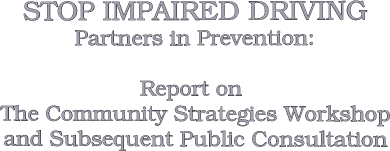
|
II) Results of Workshop Discussions and Public Consultation
4) Alcohol and Other Drug Intervention Programs
a) What are your thoughts about whether "treatment" should
include all of the elements of educational workshops, high-risk counselling and
rehabilitation of chemically dependent persons or just focus on rehabilitation of
chemically dependent persons?
- Participants thought that the concept of "treatment " should not be limited to
the rehabilitation of chemically dependent persons. Impaired driving and addictions are
not synonymous and there are different interventions that different people need. For
example, some offenders are just high-risk takers (driving, seatbelts and smoking) who
don't take responsibility for their behaviour.
- The concept of "treatment" has a lot of medical baggage and it may be better
to refer to a concept of "interventions" that may not involve residential
rehabilitation.
b) What are your thoughts about the merits of forced participation
in an alcohol/drug assessment and intervention program for impaired drivers who are
unwilling to participate in the Addictions Foundation of Manitoba (AFM) program?
- Most participants thought that forced participation in intervention programs was a bad
idea and would not be effective.
- The reasons for opposition to mandatory participation were that only 30% of AFM clients
actually need chemical dependency interventions, there is no reason to change the
voluntary approach, there is no motivation in forced treatment when clients have no
interest, forced clients will not show up for appointments (counsellors will be sitting
idle), and the AFM would need more resources but who would pay for it?
c) What are your thoughts about the potential role for the AFM in
delivering a mandatory alcohol/drug assessment and intervention program?
- Workshop participants noted that most provinces do not have a program like the AFM. It
is an effective system that helps motivate people to make changes. However, they thought
that forcing offenders into the program would not work; "You can lead a horse to
water but can't make it drink".
- Workshop participants were also concerned about how the costs of mandatory participation
would be covered and who would be responsible for service delivery when dealing with First
Nation's clients and communities.
- One public consultation respondent thought that the AFM process did not adequately check
if clients were staying sober and was concerned about using it for a mandatory
intervention program.
- Other public consultation respondents thought the AFM could handle a mandatory
intervention program and that reluctant mandatory clients who were disruptive should be
sent to jail.
d) What are your thoughts about the value of forced participation
versus the potential of disruption to the AFM program by reluctant participants?
- The consensus of the Workshop discussion groups was that mandatory programs and
assessment do not work. Mandatory participation would have a negative impact and is
potentially destructive. Voluntary participation is the most successful approach.
- Public consultation respondents recognized that forced participation could result in
disruptive clients but they thought that should not be a problem because the AFM already
has to deal with some disruptive clients, and the disruptions would lessen if difficult
clients were forced to pay the AFM program fee over and over again.
e) What are your thoughts about providing a mandatory alcohol/drug
assessment and intervention program on a user pay basis?
- The consensus of the Workshop discussion groups was that mandatory programs should not
be implemented.
- Most public consultation respondents favoured having a user pay requirement for
mandatory intervention programs and thought that might act as a deterrent to repeat
offending. However, one respondent thought that the ability of an offender to pay should
be considered before he or she was required to pay for the intervention program.
f) What, if any, measures can be taken to address the problem of
rehabilitating hardcore repeat impaired drivers?
- An effective rehabilitation strategy could include a restricted licence and an ignition
interlock monitoring device (operated on a user pay basis).
- Have them attend the "AA" program or other support groups.
- Consider removing the licence and vehicle from the offender and ending their right to
drive.
- Consider requiring them to attend a mandatory victim impact panel (used in US) or
counselling sessions with the victim or the victim's family.
g) Are there any other changes or new measures in the rehabilitation
and treatment field that should be considered by the Government of Manitoba?
- Consider having "Drug Courts" for cases involving substance abuse (same judge
each time and monitored curfews). It is costly, but has been effective in Toronto, BC and
the US.
- Consider having victim impact panels as a mandatory part of sentencing (used in the US
and Ontario).
- Consider spending more time on the assessment of the offender in order to determine the
most appropriate intervention.
- It may be better to deal with hardcore repeat offenders separately from first offenders
and they should not be in the same group.
Top of page |


![]()